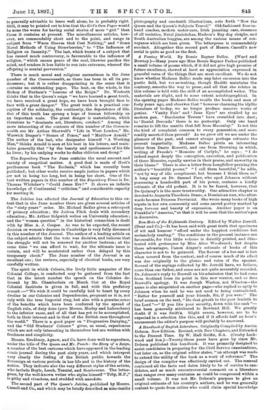A Passing World. By Bessie Rayner Bollix. (Ward and Downey.)—Many
years ago Miss Bessie Rayner Parkes published a small volume of poems which, if it did not give high promise of future excellence, showed at least an appreciation expressed in graceful verse of the things that are most excellent. We do not know whether Madame Belloc made any later excursion into the poetic field, but ver se-making, though Hazlitt maintains the contrary, smooths the way to prose, and all that she relates in this volume is told with the skill of an accomplished writer. The materials are slight, and to some extent autobiographical. In the opening pages Madame Belloc recalls the books and men of forty years ago, and observes that "however charming the idyllic literature of to-day, we no longer produce massive works of genius. Vanity Fair' and ' Jane Eyre' are rivalled by no modern pen. Barchester Towers' have crumbled into dust; to Daniel Deronda ' there is no postscript. Only one hand remains to lift the mantle that fell from Macaulay." Is not this the kind of complaint common to every generation, and more readily asserted than proved? As we grow old we are under the glamour of the past, and cannot always perhaps estimate the present impartially. Madame Belloc prints an interesting letter from Dante Rossetti, and one from Browning in which, writing of Froude's "Memoirs of Carlyle," he says : "I do indeed regret deeply the conception, execution, and publication of these Memoirs, equally unwise in their praise, and unworthy in their blame." There is also a letter from Longfellow praising the author's "beautiful poems." "I call them beautiful," he adds, "not by way of idle compliment, but because I think them so." A long essay on Dr. Samuel Parr, who aped Johnson without possessing a hundredth part of his power, contains a kindly estimate of the old pedant. It is to be feared, however, that De Quincey's is the more trustworthy. One attractive chapter is devoted to Augusta Theodosia Drane, a Dominican nun, who after- wards became Prioress Provincial. She wrote many books of high repute in her own community and some sacred poetry marked by 'deep fervour and beauty of expression. Another paper is on Franklin's" America," so that it will be seen that the author's pen is discursive.


































 Previous page
Previous page